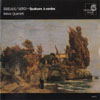Sibelius; Verdi String Quartets
Well-recorded performances of intensity and vigour, very physical, although they sometimes underplay the lyricism
View record and artist detailsRecord and Artist Details
Composer or Director: Giuseppe Verdi, Jean Sibelius
Label: Harmonia Mundi
Magazine Review Date: 8/2000
Media Format: CD or Download
Media Runtime: 53
Mastering:
DDD
Catalogue Number: HMC90 1671

Tracks:
| Composition | Artist Credit |
|---|---|
| String Quartet in D minor, 'Voces intimae' |
Jean Sibelius, Composer
Jean Sibelius, Composer Melos Qt |
| String Quartet |
Giuseppe Verdi, Composer
Giuseppe Verdi, Composer Melos Qt |
Author: DuncanDruce
Listening to the 1933 Budapest recording of the Sibelius, I was struck by the group’s lightness and swiftness in relation to the way quartets generally play it today. The Budapest Vivace second movement and finale have a natural vitality that can make the Gabrieli, or this Melos recording, sound slightly laboured; on the other hand there’s no doubt that both these modern groups find greater depth and intensity of expression in the great central Adagio di molto, or that the Melos, in particular, produces a splendidly rich, dark sonority in the following Allegretto, ma pesante. The fine 1989 Gabrieli performance is not well served by a somewhat cavernous sound; the Melos, too, is resonantly recorded, but with much better clarity and definition.
The Verdi is bold and vigorous; the Melos’s fine rhythmic control, already a feature in the Sibelius, is even more impressive here. Compared with the Juilliard or the Hagen, its is a more straightforward interpretation – the Juilliard full of imaginative responses to the colourful harmonic changes and always edging towards a smoother, more sustained sound; the Hagen goes for maximum contrast, with wonderfully graceful quiet playing, but some rather aggressive, overemphatic fortes. The Melos, by contrast, doesn’t give quite enough emphasis to the lyrical aspects of the quartet – at the moment the finale turns to the major (track 9, after 3'10'') the group doesn’t sustain the longer notes as beautifully as the Hagen does, and the passage loses its delicate emotional appeal. Generally, however, it balances the music’s different facets with great skill and feeling. It’s very physical, direct playing, yet there’s no loss of tonal quality. Recommended.'
The Verdi is bold and vigorous; the Melos’s fine rhythmic control, already a feature in the Sibelius, is even more impressive here. Compared with the Juilliard or the Hagen, its is a more straightforward interpretation – the Juilliard full of imaginative responses to the colourful harmonic changes and always edging towards a smoother, more sustained sound; the Hagen goes for maximum contrast, with wonderfully graceful quiet playing, but some rather aggressive, overemphatic fortes. The Melos, by contrast, doesn’t give quite enough emphasis to the lyrical aspects of the quartet – at the moment the finale turns to the major (track 9, after 3'10'') the group doesn’t sustain the longer notes as beautifully as the Hagen does, and the passage loses its delicate emotional appeal. Generally, however, it balances the music’s different facets with great skill and feeling. It’s very physical, direct playing, yet there’s no loss of tonal quality. Recommended.'
Explore the world’s largest classical music catalogue on Apple Music Classical.
Included with an Apple Music subscription. Download now.

Gramophone Digital Club
- Digital Edition
- Digital Archive
- Reviews Database
- Events & Offers
From £9.20 / month
Subscribe
Gramophone Club
- Print Edition
- Digital Edition
- Digital Archive
- Reviews Database
- Events & Offers
From £11.45 / month
Subscribe
If you are a library, university or other organisation that would be interested in an institutional subscription to Gramophone please click here for further information.






